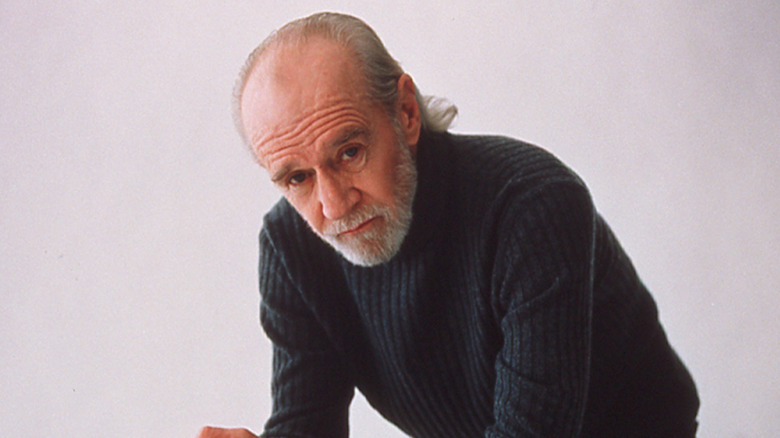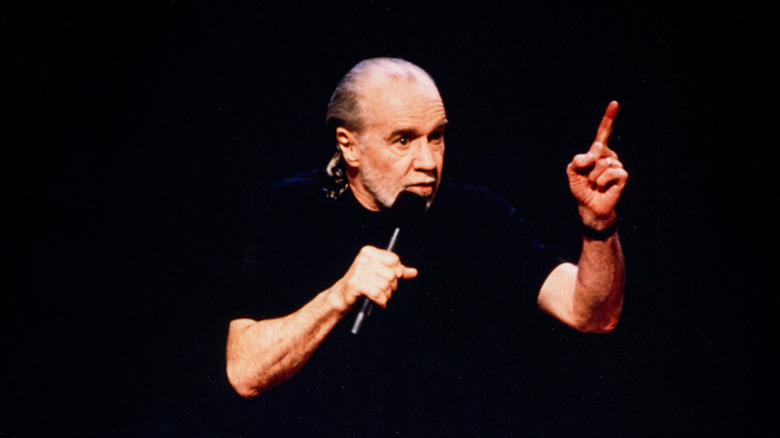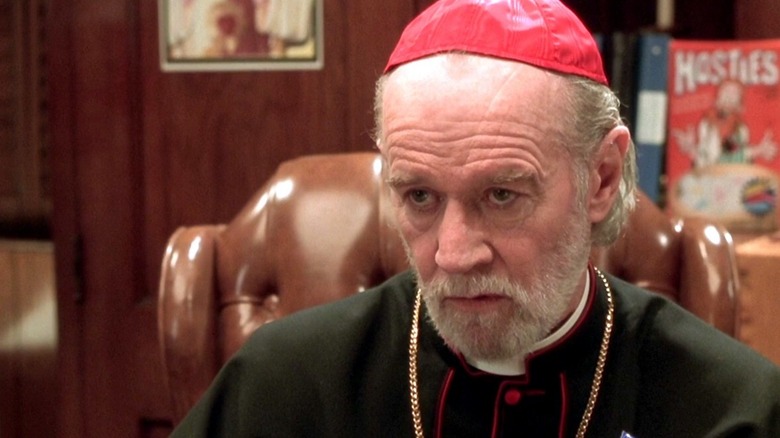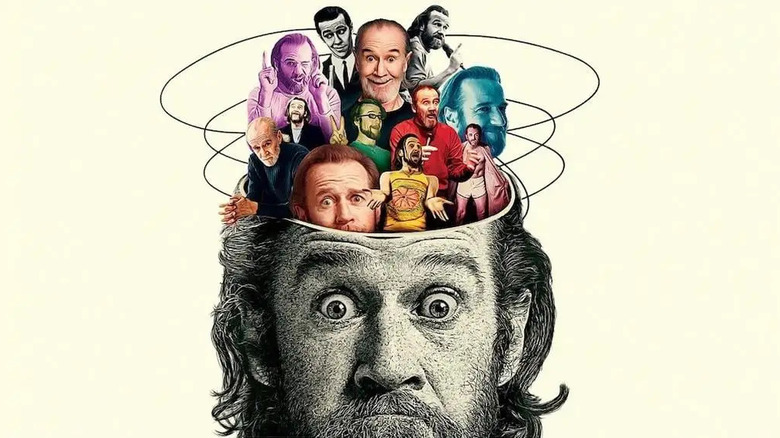George Carlin's American Dream Review: Portrait Of A Disappointed Idealist
It's important to remember that George Carlin was not on your side.
There is a tendency to mythologize Carlin — one of the best and most important figures in the history of standup comedy — as some sort of prophet for the New Age, and in 2022 it doesn't take too much digging to find memes, quotations, and video clips of Carlin addressing any random, grievous injustice of the modern-day. Carlin, who died in 2008, frequently talked to the hypocrisy of established institutions, pointing out the ridiculousness of drug laws, the arbitrariness of censorship (of his famed 1972 "Words You Can't Say on Television" bit, only two — fart and turd — have been allowed into a more acceptable vernacular), the horror of politics, and the bulls*** of religion. Because his observations cut so deep, they took on a universal quality, with Carlin unwittingly equipping his listeners with the verbal ammunition required to attack those in power. Carlin said in multiple interviews that he often encouraged his audiences to think as well as to laugh.
If Carlin did ally himself with a set philosophy, it was far away from anything the modern American politic had codified. Carlin was notoriously disgusted with mass thinking, saying near the end of his life that he loved individuals, but was suspicious of groups. Carlin was not some sort of American folk poet. If one wants to make a comparison, Carlin was far more akin to atheist philosophers like David Hume (who lambasted God and religion, and vaunted empiricism).
Judd Apatow's and Michael Bonfiglio's documentary film "George Carlin's American Dream" — airing in two parts on HBO Max starting on Mary 20, 2022 — does not compare Carlin to Hume, but it does lay out a very fair and thorough portrait of his career, his relationships, and his philosophy, capturing Carlin's thought process without tipping (too far) into embarrassing hero worship. I think Apatow and Bonfiglio understand that Carlin likely would have been grossed out by any portraitist that tried to paint him with too clean a brush, and they clearly made a great effort to be as open and as clear about Carlin's life as he would have been himself.
The compassionate undercurrent
"American Dream" takes a pretty straightforward, chronological approach to Carlin's life and career, with Part One starting with a portrait of the artist as a young man, and continuing through the late 1970s, and Part Two exploring Carlin's heyday in the '80s and early '90s, up through his death in 2008. Carlin had a habit of taking ubiquitous notes, and spent his whole life jotting down his theories about life, his ideas for bits, and many, many jokes besides. The filmmakers make ample use of Carlin's missives as a running commentary on his upbringing and evolving viewpoints, reducing the need for a steady onslaught of talking heads and gushing fans. "American Dream" does talk to a few significant comedians on Carlin and his influence — Jon Stewart, Stephen Colbert, Jerry Seinfeld, Chris Rock, and Patton Oswalt all appear, as do Kevin Smith and Alex Winter who worked with Carlin on various films — but gives more time to Carlin's daughter Kelly, his brother Patrick, Rocco Urbisci, who was director of multiple of Carlin's specials, his manager Jerry Hamza, his second wife Sally Wade, and those closer to him.
I wouldn't be so bold as to speak for Carlin or declare what he would and would not have wanted, but I suspect he would have appreciated being depicted as a man and not as a movement, a person and not an institution.
By "American Dream"'s estimation, there were only two groups Carlin was wholly in support of, and it was the groups formed by his marriages to the two loves of his life: Brenda Hosbrook and Sally Wade. Carlin often spoke of how much he loved Brenda on stage, and details his and her mutual struggle with addiction — he to cocaine and alcohol, she to just alcohol — and how much she served as a bedrock for his life. When she passed away in 1997, Carlin was despondent and, painfully enough, was in the middle of a book tour for his first published work "Brain Droppings." In 1998, he married Wade, and their relationship was just as intense and loving. The two of them began an elaborate love letter campaign wherein they detailed their relationship as an epic, myth-heavy fantasy adventure. Wade's and Carlin's letters were published in "The George Carlin Letters: The Permanent Courtship of Sally Wade."
Carlin's notes and letters to Brenda and to Sally form the main, compassionate undercurrent of a documentary that often has to face the fact that Carlin's outlook on life was, as he aged, incredibly bleak.
Not to get a big head
Carlin was wise enough to re-invent himself every decade or so, not just t keep his comedy fresh, but to keep his mind active. In the documentary's early passages, the directors have assembled many clips of Carlin's early years on variety TV, living out his dream of becoming the next Danny Kaye, only to find that he was slowly becoming dissatisfied with that broad kind of comedy. He moved out of comedy, grew a beard, and started talking more frankly about the kind of "rough" material he wasn't previously allowed to do; this was when he performed his famed "Seven Words" bit, and codified his persona as a language-obsessed, deconstructionist imp. Carlin continued on that tack until comedians like Sam Kinison and Steve Martin began outpacing him in terms of deconstructionism and satire, and he had to return with material that was even more thoughtful, more aggressive, more earnest about Carlin's own personal disenchantment with the world. The Reagan years were a dark time for America and a ripe time for Carlin to foster his hate for those in power. Carlin's career, he would argue, peaked with his 1992 special "Jammin' in New York," possibly his best work.
But as he aged, Carlin became bitterer and bitterer about the world, and his late career became so dark as to skew away from standup comedy and more into brazen nihilistic screeds. He quoted the famous adage that to scratch a cynic was to reveal a disappointed idealist underneath. By the end of his career, it became hard to see the idealism hiding underneath, and Carlin's work became more and more geared toward watching the human race destroy itself. Colbert admits that late-career Carlin was simply too dark to enjoy anymore.
Whenever "American Dream" gets a little too big for its britches — that is: when it starts delving wildly into Carlin's important place in the cultural landscape — Apatow and Bonfiglio are wise enough to undercut themselves. When one gets the impression that Carlin is becoming a massive TV star, they will include a quote about how unsatisfied Carlin was. When following Carlin's career through the '70s, they include criticism from Cheech Marin or spoofs from MAD Magazine or "SCTV" about the weakness of his material. The most critical moment in "American Dream" comes from, of all people, Jerry Seinfeld, who points out — rightly — that no comedian has ever changed someone's point of view, and let's not get carried away with how "important" comedians can perceive themselves to be.
Overall
"American Dream" contains a lot of readily available clips from Carlin's standup work, and those who had been following Carlin's career for any span will likely be familiar with large portions of Carlin's story; it will serve less as an education for many, and more of a reminder. "American Dream," which runs nearly four hours in toto, attempts to be thorough and is careful to give each stage of Carlin's career its due without ever falling completely into the trap of hero worship.
The title, we find from the film's coda, is most certainly ironic. Carlin pointed out that the American Dream was so named because you had to be asleep to believe it. Rather than leaving audiences feeling sentimental about Carlin and his deep abiding love for individuals, Apatow and Bonfiglio repeatedly slam audiences in the face with how bad the world is now. A sour, angry Carlin rant from 20 years ago is just as relevant now as it was at the time, and that is incredibly sad.
Many in the social media sphere's have said — and this is discussed in "American Dream" — that Carlin's commentary on a post-Trump world would be welcome, and his bitterness would be welcome as a salve. Given how disgusted Carlin was with the world at the end of his life, I am glad, personally, that he was spared having to witness it.
"George Carlin's American Dream" will debut on HBO on back-to-back nights. Part 1 debuts May 20, 2022, with part 2 debuting May 21, 2022. Both episodes will be available to stream on HBO Max beginning Friday, May 20, 2022.



